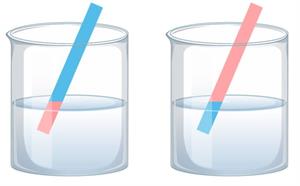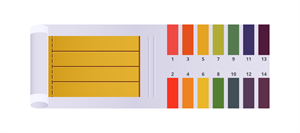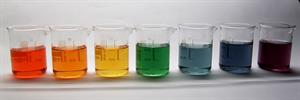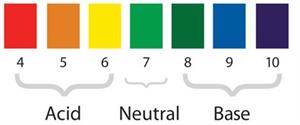
PUMPA - SMART LEARNING
எங்கள் ஆசிரியர்களுடன் 1-ஆன்-1 ஆலோசனை நேரத்தைப் பெறுங்கள். டாப்பர் ஆவதற்கு நாங்கள் பயிற்சி அளிப்போம்
Book Free DemoHow to determine the \(pH\ \)of a solution?
A solution's \(pH\) can be measured using a universal indicator.
What is a universal indicator?
The universal indicator is a combination of different indicators that produce various colours at various \(pH\) values over the entire scale. It contains a mixture of dyes. It comes in two forms: A solution and \(pH\ \)paper.
The most common indicator is litmus, which is used to determine whether a solution is acidic or basic. Acids convert blue litmus into red, while base or alkali converts red litmus into blue (as shown below).

Testing acid and base solutions using litmus paper

\(pH\) papers

Solution form of \(pH\) indicators

Universal indicator \(pH\) chart
In a school laboratory, \(pH\) paper is commonly used to measure the \(pH\) of a solution. A \(pH\) paper is made up of a variety of indicators. At a set of \(pH\), it displays different colours. A colour guide is included with the indicator bottle or the \(pH\) paper strips (strips of paper impregnated with it). A drop of the test solution is either put on the \(pH\) paper or tested with a drop of the universal indicator. The \(pH\) value is calculated by comparing the colour of the solution on the \(pH\) paper to the colour chart. The \(pH\) values thus obtained are approximate values only.
Reference:
https://th.bing.com/th/id/R.054b122907094ce2bc986fcd39de9f27?rik=7JCd3HP%2fUMwGJQ&riu=http%3a%2f%2f1.bp.blogspot.com%2f-OtJG-dfF_88%2fT6ZQGamzbbI%2fAAAAAAAAAGY%2fbp7R7RB_Tjg%2fs1600%2funiversal_indicator_chart.jpg&ehk=Ht1HYQfNEGc1%2fJ%2b1FxHNq7upNoCKbZVjDfcoVD3LgqM%3d&risl=&pid=ImgRaw&r=0